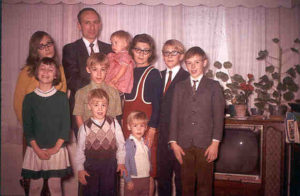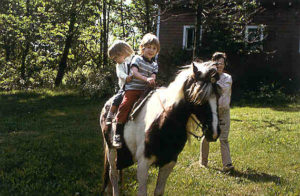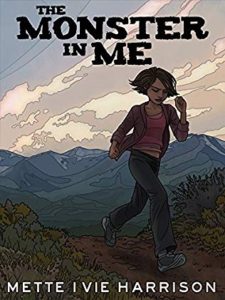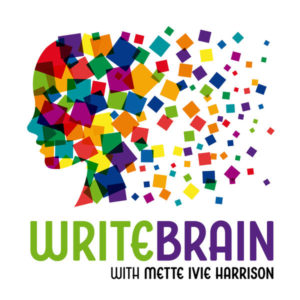
I grew up ninth in a family of eleven children. Growing up in a large family like this, there are many, many similarities in character traits and abilities. All six of my brothers and one of my sisters are computer programmers (my father was a computer science professor at BYU). We all got scholarships to BYU and we looked so much alike as children that I was frequently asked if my next oldest brother and I were identical twins. Looking back at photographs, I have some sympathy for this question. We were nerdy, socially awkward, intensely interested in minutia, loud and unashamed of our loudness, badly dressed, small in stature, brown-haired, blue-eyed, with broad cheekbones, and well, Mormon.
I was driven to academic success in part because of competition with my siblings. I remember on more than one occasion, my father asking at dinner if my brother or I had gotten the high score on a test we’d both taken. In high school, I took as many classes as I could, including two during the lunch hour, and all three languages offered (French, German, and Spanish). I was a Sterling scholar and a “Benson scholar” at BYU, one of the top twelve young women who were incoming freshman. I graduated with a B.A. and M.A. two years after high school, then got a perfect score on the verbal portion of the GRE, which helped me get a full ride scholarship to a PhD program at Princeton University at the ripe old age of 19.

I remember after coming back to BYU to teach that someone said something indicating surprise at what I’d accomplished at such a young age and my response was to say, “But I’m a Mormon,” and to me, that explained everything. It has taken me another twenty years to reflect on that assumption in my own mind, about what Mormonism meant and what it required of me and to what degree I owe my success to the pressure from being Mormon and what I owed to God for that “blessing.”
I knew I wanted to be a writer in Kindergarten. I loved stories and a kind teacher suggested I had a talent, even at that young age. I don’t know if I needed her affirmation or not. I certainly didn’t need my parents to tell me that I should be a writer. They didn’t. They spent most of my childhood and teenage years trying to talk me out of it in favor of a more sensible career (in hindsight, I have more sympathy for them than I did at the time). But I can see now that one of the problems with their strategy was the very Mormonism that they fed me every minute of every day. As a Mormon, I was supposed to have grand dreams for making the world a better place. I was special, a chosen child of God, saved for this generation when the world was so wicked. I was supposed to help usher in the Second Coming of Christ. A lot of this rhetoric has been toned down since I was young, but there are still vestiges of it there.
In any case, it gave me what some might call was an inflated view of myself and how important my life was to the rest of the world. Yes, many writers have grand dreams of writing “the great American novel,” but I had theological underpinnings to mine. I wasn’t just writing an American novel. I was going to write the great American Mormon novel. I had God on my side. I also watched as other Mormons were doing creative work that I thought was frankly beneath them. They were writing to an exclusively Mormon audience and while I sometimes enjoyed their work, I planned to be read by a national audience and published by a big New York publisher.
Once I hit college, the reality of the hubris of my dreams hit me hard, especially since I was studying the greatest literature ever written in the history of the world: German literature. Trained as a critic from BYU to graduate school, much of the work involves seeing a work of art as a perfect whole. For almost ten years, I didn’t write anything of my own because my own creativity was so stifled by my fear of falling short.
However, I will say that my sense of Mormon exceptionalism must surely have been at play when it came to my ambitions for myself academically. I never once doubted that I would get into the graduate school of my choice, Princeton. I never questioned whether I, as a Mormon woman, should have been focusing on graduate work instead of settling down to have children. Firstly, this was because my parents fully supported my academic work. But it was also because as I was growing up, I had heard the messages about following God’s plans for you more loudly than any messages about women not belonging in the workplace. Secondly, I was young enough when I started grad school that pressure was less intense and it was less intense because I was back East. Thirdly, I had no doubts that I could do grad school while having a baby—in fact, I gave birth to my first daughter in 1994, before I’d finished my dissertation, and to my second daughter in 1995, just after I officially graduated.
By then, things had changed in my mind a lot. My final year in graduate school, I became tired and rather jaded with great works of “literachur.” I began sneaking into the Princeton library and reading Orson Scott Card, the only Mormon I knew of who had a national audience.
I didn’t seriously try to publish anything until after grad school, in fact, until after I had given up academia forever and refused a continuing offer to teach at BYU as an adjunct (this I considered beneath me). I was told very pointedly by one member of a full-time hiring committee that I hadn’t been hired because I had the gall to think I should be writing commercial literature instead of just writing about other people’s work. Such arrogance had to be earned, it seemed.
Over the next four years, I worked on recovering from the terribly pedantic style that had become natural in graduate school. To do that, I wrote 20 novels, all of them terrible, but all of them terrible in completely different ways. I was giving myself a graduate education in creative writing. My 21st novel was accepted for publication in 2002.
 But strangely, many of my ideas about God’s mark of approval on my writing had disappeared. Instead of writing the great American Mormon novel, I did everything I could to avoid talking about Mormonism, even tangentially. My first novel, The Monster In Me, is contemporary and set in Heber, Utah. There is a Mormon family who fosters a young woman in distress, but I kept writing out any specific reference to their religion, and making sure that the one prayer offered by the family is non-denominational. I was convinced after numerous negative experience in grad school that being Mormon was a curse, not a blessing, when it came to creative success.
But strangely, many of my ideas about God’s mark of approval on my writing had disappeared. Instead of writing the great American Mormon novel, I did everything I could to avoid talking about Mormonism, even tangentially. My first novel, The Monster In Me, is contemporary and set in Heber, Utah. There is a Mormon family who fosters a young woman in distress, but I kept writing out any specific reference to their religion, and making sure that the one prayer offered by the family is non-denominational. I was convinced after numerous negative experience in grad school that being Mormon was a curse, not a blessing, when it came to creative success.
And so I went along, secretly adding messages about my own life and my Mormonism to what became fantasy novels for teens, “clean reads” that never spoke about teen sex, drugs, or drinking (largely because I had no experience with any of those things and could not write about them if I wanted to). I wrote these books and was successful enough to have endcaps at Barnes and Noble, to be asked to write sequels to my most successful book, and then to land a deal for a trilogy with only a proposal and sample chapters to go with it. I thought I was on the fast track to the kind of success that I’d always dreamed of, New York Times Bestseller status, full-time writing and money, and name recognition.
But all this was derailed when I went through a faith crisis following my sixth child’s death at birth, questioning my own Mormonism and therefore my exceptionalism and my purpose in this world. If God had meant for me to be a famous writer, and if God controlled all of the tiny moments in my life from inspiring me to write each day to directing me where to send my novels, then He had also controlled my daughter’s death. And when I rejected the idea that God had designed that, I rejected God altogether. I rejected my own Mormonism.
The strange thing about this is that following five years of suicidal depression, I began to write about Mormonism. Not the same kind of God-centered exceptionalist Mormonism that I had believed in before, but a new Mormonism. What I called “my Mormonism,” that has a tentative belief in a God who doesn’t intervene, a God who might be male or female, and a God who had no interest in telling me what I should do with my life. That was up to me.
 I look back on my life now and wonder—if I hadn’t believed in a God who would make all things possible if I worked hard enough and was righteous enough, would I ever have become a writer? Would I have been able to get through those bad twenty novels? I look back on my early writing and honestly, don’t see much special about it. I’ve put some of it up on my website for people to look at and mock, because I want other writers to see how bad you are when you begin. I have started talking frankly about the limits of talent and the abundant uses of hard work and determination. I also talk about fear, doubt, and the sense of not being good enough on my podcast, Write Brain. I don’t think that fear and doubt were problems before my faith crisis and rejection of exceptionalism. I believed firmly and completely in my destined path to success.
I look back on my life now and wonder—if I hadn’t believed in a God who would make all things possible if I worked hard enough and was righteous enough, would I ever have become a writer? Would I have been able to get through those bad twenty novels? I look back on my early writing and honestly, don’t see much special about it. I’ve put some of it up on my website for people to look at and mock, because I want other writers to see how bad you are when you begin. I have started talking frankly about the limits of talent and the abundant uses of hard work and determination. I also talk about fear, doubt, and the sense of not being good enough on my podcast, Write Brain. I don’t think that fear and doubt were problems before my faith crisis and rejection of exceptionalism. I believed firmly and completely in my destined path to success.
Do I wish I had never gone through my faith crisis? No. I really treasure the results of that, both the change in my empathy for others and in my clearer view of myself. But I also recognize that Mormonism has made me who I am and I have a deep gratitude for that. I have a debt to repay in a way that I do not know how. I find I am not much of a missionary for Mormonism, at least not in the sense that I was taught was important as a child, bearing testimony without doubt and calling others to be baptized. And yet, I’ve been told over and over again by those non-Mormons who read my Linda Wallheim books, and The Book of Laman, that I’m a missionary in another way. I show my readers Mormons as flawed humans, some of them very appealing precisely because they are mortal and limited—like my readers are. Instead of some Stepford-wives level of perfection, my characters are real, and my Mormonism seems to be like my readers’ own religions, whatever they are, which is to say: quirky, beautiful, flawed, and peace-bringing as well as infuriating.
